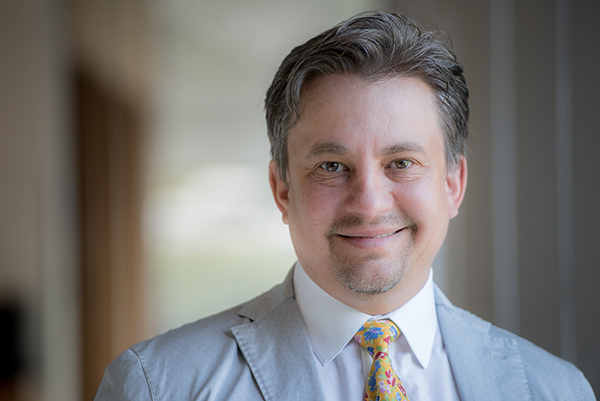
When Denis Evseenko was still a student at Novosibirsk State Medical University in southern Siberia, he began pondering the meaning of life.
“I was reading a lot of philosophic things [saying that] everything is pointless because you will die,” said Evseenko, who is now an associate professor of orthopaedic surgery, and stem cell biology and regenerative medicine at USC. “And the only one thing that makes it not completely pointless is that you can have a next generation. Kids will be born. Life will continue. So for me, this was such a big thing.”
The process of pregnancy and fetal development fascinated Evseenko not only from a philosophical perspective, but also from a biological one. So after earning his medical degree in 1999, he joined an embryology laboratory at the Scientific Center of Clinical and Experimental Medicine, also in his hometown of Novosibirsk. He studied how the human placenta regulates oxygen supply to the fetus and influences lifelong cardiac health.
In 2004, Evseenko moved to New Zealand, where he pursued his PhD in pharmacology at the University of Auckland’s Liggins Institute. At the same time, he and his wife welcomed the first of two daughters into their family.
Throughout this time, Evseenko continued to study the placenta, detailing how certain drugs interfere with fetal development.
“I realized that when something goes wrong in development,” he said, “there’s very little you can do to actually change the outcomes.”
He wanted to change outcomes, and stem cell science offered a possibility to leverage his expertise to help patients. So he delved into the stem cell field as a postdoctoral researcher in the laboratory of Gay Crooks, first at Children’s Hospital Los Angeles, then at UCLA. He then started his own laboratory at UCLA focused on stem cell-based cartilage repair in 2011, and moved to USC as an associate professor of orthopaedic surgery, and stem cell biology and regenerative medicine in 2015.
It Requires Patients
“For me, it’s not science for science,” said Evseenko. “I need to see it going somewhere.”
To this end, the Evseenko laboratory is advancing some of its recent scientific discoveries towards clinical trials.
With funding from the California Institute for Regenerative Medicine (CIRM), the lab is working to develop cartilage implants made from stem cells. Surgeons could use these cartilage implants to repair sports-related knee injuries, which affect more than 10 percent of people under 50 years old. Evseenko aims to start clinical trials for this stem cell-based cartilage implant by late 2020.
Evseenko and his company CarthroniX are also working to develop new drugs based on a molecule called HX-1, which can curb inflammation and promote regeneration.
A topical form of HX-1 is already on the market as a cosmetic anti-aging serum, named Heraux. Cosmetics proceeds will support the further development of potential medical applications for HX-1.
One of these potential medical applications is slowing the progression of jaw arthritis, caused by problems with the temporomandibular or TMJ joint. In collaboration with USC Stem Cell scientist Yang Chai and researchers at the University of Guelph in Canada, Evseenko is involved in the pre-clinical NIH-funded testing of an injectable form of one of the potent and selective HX-1 analogs called CX-011 to reduce inflammation related to TMJ arthritis. The group is also conducting a Department of Defense-funded pre-clinical trial of CX-011 for osteoarthritis of the knee. Recently, animal studies showed that CX-011 is a very safe drug. The scientists intend to launch a clinical trial in 2021.
Evseenko and collaborators at several universities are also exploring the potential of CX-011 to help patients with autoimmune diseases. If CX-011 can achieve this, Evseenko’s early embryology studies will come full circle.
“These diseases are so painful, especially a form of rheumatoid arthritis called juvenile arthritis and lupus, both most often affecting young females,” said Evseenko. “They need to take drugs that are Category X or D, which means these drugs cause birth defects in their babies. So my main patient passion is about these young females—making pregnancy healthier and helping to deliver healthy babies. If we can do anything to help them, I’ll feel good.”
